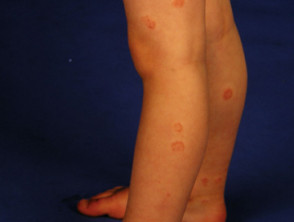New one-year data show that apremilast (Otezla, Amgen) results in sustained improvements in disease severity and skin involvement for kids and adolescents with psoriasis.
“The main takeaway message is that apremilast is safe and effective in pediatric psoriasis and the only oral agent studied for this indication,” study author Loretta Fiorillo, M.D., FRCPC, clinical professor of pediatrics, University of Alberta, tells TDD. “This study adds the 36 weeks open-label extension which demonstrates sustained improvement over this time and no new side effects. “
At 52 weeks, more than half of kids taking apremilast achieved clear or almost clear skin. What’s more, apremilast showed increased efficacy beyond that seen at the week 16 primary endpoint, with durable maintenance of response, the study showed.
The safety profile was consistent with previous Apremilast studies.
A Closer Look at Sprout
SPROUT, a multicenter, randomized, placebo-controlled, double-blind study, included pediatric patients aged 6 to 17 who had moderate to severe plaque psoriasis inadequately controlled by or intolerant to topical therapy. All patients in the study received apremilast for a 36-week extended active treatment period following the 16-week randomized placebo-controlled treatment period. There were 186 patients who completed the 36-week extension: 125 who continued to receive apremilast, and 61 patients switched from placebo to apremilast.
Study findings include:
- 56.3% of patients who received apremilast through week 52 achieved static Physician Global Assessment (sPGA) response (score of ≥3), an investigator assessment of overall disease severity of plaque psoriasis, the study’s primary endpoint.
- 52.5% of patients who switched from placebo to Apremilast achieved sPGA response at week 52.
- 71.4% of patients who received apremilast through week 52 achieved Psoriasis Area and Severity Index (PASI)-75, an investigator assessment of disease severity and skin involvement, a secondary endpoint.
- 75.4% of patients who switched from placebo to apremilast achieved PASI-75 at week 52.
- Treatment-emergent adverse events (AEs) were consistent with the known safety profile of apremilast in adults. The most common AEs (>10%) throughout the study were nausea, diarrhea, abdominal pain, vomiting and headache.
These data were presented at the 2024 American Academy of Dermatology Annual Meeting in San Diego, CA.
PHOTO CREDIT: DermNetNZ


